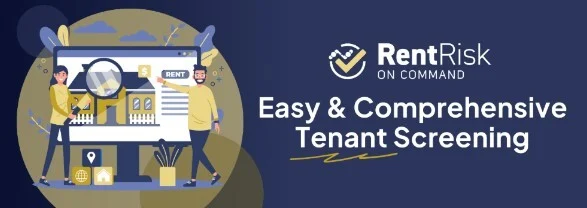Should You Hire a Property Manager for Your Rental Home?
The further you live from your rental property, the harder it can be to maintain and manage it. And if you’re like thousands of military landlords, you have a lot of personal and work-related business going on. It may be time to consider hiring a property manager.
You may be inclined to hire a property manager if you’re moving across the country and don’t want to be responsible for finding tenants and handling the day-to-day property upkeep, like scheduling maintenance and repairs. But before hiring one, you need to know exactly how their business operates and how you’ll work with them in the future.
What a Property Manager Does
Fill Vacancies and Screen Tenants
One of a property manager's primary responsibilities is to advertise the vacant rental property and find suitable tenants. Part of finding a tenant involves investigating their personal information. After applicants fill out a lease, property managers run credit and background checks and call employers and personal references. Their job is to determine if the tenant has a background that will lead them to treat your property respectfully and pay the rent on time.
Manage Tenant Communication and Lease Agreements
Property managers review the rental agreement with tenants, answer questions, and sign the lease. Any time the tenants have any questions or concerns, they’ll contact the property manager.
Collect Rent
Your property manager should ensure that tenants pay the correct rent amount on time each month. The manager would also be responsible for enforcing late fees or other agreed-upon penalties if they don't.
Perform Maintenance and Repairs
The property manager is responsible for the property upkeep of rentals by responding to tenant calls for maintenance and repairs. As the homeowner, the property manager would only contact you to authorize a purchase or simply inform you, depending on your agreement.
Maintain Records
Every month, the manager should provide you with any notes, receipts, and records they have on the property. Property manager services vary, so discuss the exact details of their offerings before signing a contract.
Conduct the Move-Out Process
Returning to your property to prepare for the next tenant is time-consuming and expensive. A hired property manager conducts the move-out inspection and determines how much security deposit should be returned to the tenant.
If you’re new to the rental property business, read 7 Common Issues Landlords Face and How to Tackle Them.
Expectations of the Homeowner
No matter how great they are, property managers don’t handle everything. Homeowners have their own list of responsibilities regarding property upkeep for rentals.
Pay the Property Manager
Plan to budget part of your monthly income to pay for their services. It’s possible to negotiate the monthly fee, but many homeowners and property managers often settle between 8% and 12% of the monthly rent collected, depending on the market, property type, and scope of services. Fees are typically deducted directly from rent collected.
Create a Fund for Repairs
Your property manager will coordinate both routine and emergency repairs, but you’re still paying for them. Most managers require a maintenance reserve (around $250–$500 per property) to cover small repairs without delay.
You should also maintain a separate emergency fund for larger, unexpected issues, like HVAC replacement or roof repairs that the manager will not handle without your involvement.
Give Up Control (Mostly)
If handing over day-to-day decisions isn’t your thing, a property manager may not be the right fit. Managers typically have spending thresholds, for example, approving repairs under $300 without the owner's permission. Micromanaging beyond what’s outlined in your contract can strain the relationship and slow response times.
Assume Liability
Even with a property manager in place, the homeowner is legally responsible for the property. This includes habitability standards, fair housing compliance, safety issues, and adequate insurance coverage. A property manager helps reduce risk, but they don’t eliminate it. You should carry appropriate landlord insurance, understand your local landlord-tenant laws, and ensure your management agreement clearly outlines indemnification and liability limits.
Follow Up
Clear expectations from the start are key. For example, require copies of invoices, before-and-after photos for completed repairs, and regular maintenance reports. Periodic check-ins help ensure your property is being maintained properly without undermining your manager’s role.
 Photo by annastills via Canva.com
Photo by annastills via Canva.com
Questions to Ask Your Property Manager
What services are covered?
While the above addresses a handful of tasks most property managers handle, your experience may vary. Find out exactly what you’ll pay for each month.
What fees do they charge?
Ask about initial set-up fees, finding tenant fees, vacancy fees, lease renewal fees, lease renewal charges, marketing fees, eviction fees, unpaid invoice fees, and the percentage of monthly income they charge.
These fees may sound excessive, but most are there to cover the expenses associated with running background checks, advertisements, and the property manager's time.
How many properties are they managing?
Coupled with references, knowing how many properties the property manager manages will clue you into how many people trust them with their rentals and also indicate how much time they have to focus on your property.
How do they handle vacancies?
When the property becomes vacant, where does the property manager market the property, and what does the advertisement look like? Insist upon good quality photos, various advertisements, and listing on MilitaryByOwner, if it’s near a military installation.
What is their communication style?
Discuss an appropriate response time, how they would reach you in normal circumstances and in an emergency, and how often they plan to check in with you.
How do they handle property upkeep for rentals?
Some property managers request a reserve fund that they can use to make necessary property repairs or maintenance without consulting you first. As stated above, this fund is often between $250 and $500. Once they’ve depleted the set amount, the property manager must contact you for additional expenses.
How often do they plan to check on the property?
Find out how often the property manager plans to drive by to do a simple outside check or knock on the door, and ensure the tenants are caring for the property. Casually checking in every so often can help prevent disasters that can occur without accountability.
Before hiring a property manager, shop around and compare companies. Rely on personal referrals, research, and reviews. Review pricing, services, and personalities to find the best fit. Remember, you’re searching for a professional you trust to handle one of your largest financial investments and protect an emotional attachment to a property you may one day call home again.
Whether you hire a property manager or learn how to manage a rental property on your own, there's a lot more to know about the rental business! Our free resource below is designed to walk you through every aspect of owning a rental home.







